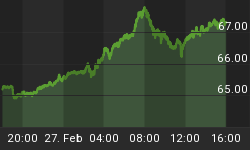Thursday's spotlight turned out not to be on the European summit but on the ECB. As expected, the central bank cut rates 25bps (although some expected 50bps) and loosened collateral criteria so that banks can pledge dicier assets at the ECB.
By the way, although this is a bad idea it becomes necessary because the best-quality collateral - sovereign bonds - are the securities causing all of the problems, so if a bank wants to rid itself of toxic sovereign bonds it also rids itself of a lot of collateral. So banks were doing "collateral swaps" (a good explanation is given by the Financial Times here) in increasing amounts, which in turn has the effect of creating a great contagion possibility if banks falter.
The Danish Central Bank also cut rates, to 0.80% from 1.20%, in case you're keeping score.
But the real fireworks came when new ECB President Draghi declared that the ECB wouldn't lend to the IMF to re-lend to sovereigns in need of aid, noting that the capital-T Treaty prohibits the ECB from financing member countries (and cute optics aside, that's plainly what the plan was). Equity investors were shocked. The Gordian Knot of treaty obligations and limitations was supposed to be subordinate to "whatever needs to be done," wasn't it? After all, in the U.S. the Federal Reserve in 2008 was, um 'flexible' about its interpretation of its legal limitations.
If EU ministers were unified, that Gordian Knot could be cut. But the knot was tied that way on purpose; it was supposed to be problematic to circumvent because smaller countries needed assurances that their will would not be circumvented. For example, Finland's Grand Committee of parliament today rejected the notion put forward by Merkel and Sarkozy that financial rescues conducted by the ESM needed to be fast-tracked and approved by a "qualified majority" rather than requiring unanimity. Finland pointed out that the treaty requires unanimity, and they (quite reasonably) intend to resist weakening that protection of their sovereign prerogative.
So the probability of having something awe-inspiring emerging from the European summit...something which would save the ratings of many of the Eurozone members...is very obviously decreasing. The rules are constraining the options, as they were meant to.
Stocks dropped 2.1% on this dawning realization, as well as the notion that the ECB isn't ready to pull the "Quantitative Easing" lever as rapidly as investors were expecting them to. Inflation-linked bonds were very weak, with inflation swaps down 6-10bps despite a rallying bond market (the 10y nominal yield fell to 1.98%). Commodities were somewhat weak (DJ-UBS -0.8%), but not too bad compared to what happened in inflation markets.
This was probably partly due to some investors getting cold feet when the ECB didn't come forth with a fountain of cash. I don't think Draghi was as intransigent on this point as he was made out to be, and I think the ECB will continue to buy bonds until they simply can't sterilize them all and they back into QE. But let's suppose that the ECB really was immovable on this point, and central bankers determined that more was needed. In that case, I think it increases the chances of the Fed doing QE3. Liquidity is liquidity, as last week's example with the coordinated action on swap lines reminds us. It's more awkward to print dollars if Euros are needed, but there is a way to change dollars into Euros!
This is why inflation is substantially a global phenomenon, with something like 2/3 of the inflation in developed nations coming from a common global factor. You can't just watch the Fed, although the Fed moves the needle the most. You have to watch the global tide of money, which (it hardly needs to be said) continues to rise.
While all eyes are turned on Europe, few cared about the somewhat stronger-than-expected Initial Claims (381k) today. And in the U.S., it seemed that few noticed that Japanese data has taken a serious turn for the worse. Japanese data last night (Our Wednesday night) was awful. October Machine Orders were -6.9% versus expectations of +0.5%, and that follows -8.2% in September. Don't look now, but that's the worst consecutive months of orders since Nov/Dec '08. Somehow Japan's fiscal situation has escaped notice, even though this AA-rated nation has a debt-to-GDP ratio of 200% (as of 2010 according to the CIA Factbook), which is substantially higher than Greece's (143% in 2010) and Italy's (119% in 2010). But let's not think about that right now...
Choppy trading will continue on Friday and it will probably stay that way even after the summit ends, at least until the end of the year. It seems to me that stocks are more vulnerable to the downside due to optimistic positioning, especially with a weekend looming and every indication that big solutions are unlikely to come out of this summit. But I am happy to keep my hands off the trigger.















